- Home
- Anna Humphrey
Ruby Goldberg’s Bright Idea Page 2
Ruby Goldberg’s Bright Idea Read online
Page 2
I knew.
So did Penny.
Telling people about the time he’d met the famous cartoonist and inventor in New York was one of Grandpa’s favorite things to do. “Quite the gentleman,” he began, “as sharp as a tack, and a real—”
“Barrel of monkeys,” I finished for him. Grandpa put his hands on his hips and glared at me for interrupting his story, but I could tell he wasn’t mad—not really.
“Who said I was talking to you, missy?” he joked. “I was telling my story to Penny here.” Penny looked up from the floor where she’d plopped down beside Tomato’s bed. She smiled, but only because she was way too polite to tell Grandpa that she’d also heard the Rube Goldberg story at least a hundred times.
“Back in the fifties Rube Goldberg was best known for the cartoons he drew,” my grandpa began. “They featured machines that would perform a complicated series of movements to complete a simple task. Say you wanted to scratch Tomato’s ears, like you’re doing now,” he explained. “You might get yourself the hand of a mannequin and attach it to a dowel, or a long stick.” Grandpa’s face was lit up, like it was every time he talked about Rube Goldberg machines. You could practically see the gears of his mind winding up and spinning in sync. “Then you could attach the end of the dowel to a spring, and above the spring you could position a small mallet to compress it. The pendulum of a ticking clock could be attached to a lever that would swing the mallet, compressing the spring and moving the mannequin hand up and down. And there you have it, a Rube Goldberg machine to pet your dog!”
“Or you could just sit here and use your hand,” Penny said, giving Tomato a good scratch.
Grandpa laughed. “Or you could do that. But half the fun of a Rube Goldberg machine is watching it work in a complicated way to do something so simple.”
“That’s it!” Penny said suddenly. “Ruby! You should build a Rube Goldberg machine for your science project. I mean, you are named after the guy.”
Grandpa blushed a little, probably remembering that Penny already knew his whole story about Rube Goldberg—including the part where he’d convinced my dad to name me after him—well, almost. I’d already had the Goldberg part, of course, and “Ruby” sounded a lot like “Rube.”
Here’s how that story goes: When I was just a few days old, I was waving my arms around while my mom was changing my diaper. One of my fingers got caught in the pull cord on the window blinds next to the change table. The blinds moved a little and tipped over a broom that was leaning up against the wall. When the broom fell, it knocked a small houseplant off the windowsill. At precisely that moment my dad was walking past with the laundry basket, and the falling plant surprised him so much that he dropped the whole thing onto his big toe. The shock of that made him hop around the room shouting, and he bumped into a lamp that crashed to the ground and broke.
“It was Ruby’s roundabout way of telling her parents to turn the lights off already so she could get some sleep,” Grandpa always finishes the story, laughing. “And I knew right then what we should name her.
“Well,” Grandpa said now, changing the subject as he poured us glasses of lemonade. “I’ve got the game set up. Are you girls ready to play?”
We’d been having a Friday croquet tournament for the last month. Penny and I were tied with two wins each, although I had a feeling it was only because Grandpa was letting us win.
“Definitely,” Penny said. “You’re going down, Goldbergs.”
“Oh, I doubt that, Penny Parker,” I teased back. I was just about to close the sliding door behind us, when I noticed Tomato, still in his bed. “Toe-MAH-toe!” I said. It’s what I called him when I was feeling fancy. “You coming, boy?”
Tomato loved to chase the croquet balls through the wickets. Sometimes Grandpa had to tie him up when the score was close, because otherwise he’d ruin the game. The dog opened his sad basset hound eyes and looked up at me mournfully, like he’d just lost his favorite chew toy and his heart was breaking into a billion pieces. Of course, that was how he always looked—even when he was happily chasing croquet balls or eating liver treats. But instead of leaping up on his stubby legs to trot after me, Tomato laid his head back down.
“He’s a little out of sorts today,” Grandpa said. “Maybe the heat.” Grandpa walked over, bent down stiffly, and scratched Tomato in his favorite spot—right on the white patch on top of his head. “Poor guy,” he said as Tomato looked up sadly. “It’s tough getting old, isn’t it? You can’t get up and go like you used to. I know the feeling.” Tomato lifted his head and pushed it into Grandpa’s hand so he could get an even better scratch. “We’ll check on him later,” Grandpa told me. I bent down to give Tomato a scratch too.
“You’re a good dog,” I told him. “Yes, you are.” I flopped his ears around a little—because they were just so floppable. Then I stood up, slid the patio door open, and went to kick some croquet butt.
Chapter 3
In the end Grandpa won that day’s croquet game, tying the tournament three ways.
“You know what this means . . . ,” he said. “We’ll have to keep playing.”
Again, I couldn’t prove anything, but I had a feeling he’d done that on purpose. My grandpa liked spending Fridays with me and Penny. And that was fine with me. I liked it too. The only problem was that it meant I always got home late, which meant that my sister Sarah was bound to have taken most of the pizza-night pepperonis.
“Mom!” I complained as I came into the kitchen and started to spread sauce on the mini pizza crust set out for me. “Sarah did it again.”
“What?!” my sister exclaimed, taking yet another stack of pepperonis out of the package. “I need them for my pattern. It goes pepperoni, olive, pepperoni, red pepper.” I looked at her pizza. It was perfect, almost like a flower, with the toppings arranged in a spiral that started in the center. But that didn’t change the fact that it wasn’t fair.
“Any particular reason the fridge is half full of balloons?” my mom asked casually. Her head was deep inside the refrigerator, where she was searching for the jar of hot peppers she and my dad liked to use. I’d had to move a few things around in there that morning to fit the balloons in, which explained why she couldn’t find the jar. “Ruby?” she prompted.
“I’m exposing them to twelve hours of cold air,” I said matter-of-factly. “Don’t let me forget to measure their circumference after dinner.” It was an experiment I’d found online about the effects of temperature on air pressure.
“There are a whole bunch on the floor in the living room too,” Sarah reported. That was my “control” group, at room temperature. If anyone had used the basement bathroom that day, they would have noticed another bunch tied with strings to the grates of the heating vent in there where it was nice and warm.
My mom found her hot peppers and closed the fridge with a small sigh, leaving my balloons in place. Every now and then my experiments are not so convenient for my family—like when I used up all of my sister’s school glue in my homemade slime experiment and forgot to tell her, or the time I tried to melt together toothpaste and Juicy Fruit gum to make my own anti-cavity gum, and it got so stuck to the bottom of the microwave that we had to get a new one. Mostly, though, my parents and Sarah just work around my experiments when they find them.
“Sarah,” Mom said, eyeing my sister’s pizza. “Share some pepperoni with your sister, okay?”
Sarah sighed, tossed her curly hair, and started picking the pepperoni off her pizza. “Fine,” she said, putting them onto my plate. “I’ll just make a new pattern.” She reached for the bowl of pineapple chunks. I was sure that whatever she created next would be even nicer. My sister hardly ever did anything that wasn’t perfect.
I chose a tomato slice and put it smack in the middle of my pizza like a giant clown nose, then plopped down some sliced olives for eyes.
“How was everyone’s day?” Dad said, coming into the kitchen and taking the jar of hot peppers from Mom.
> I was about to start telling my parents about the science fair and asking for their advice. Since Penny had suggested making a Rube Goldberg machine, I hadn’t been able to get the idea out of my head, and I was definitely going to do it. I just wasn’t sure what the machine would be for. All I knew was that it had to do something important if it was going to win me the gold. But before I could get a word in, as usual, my sister stole the spotlight.
“My day was great!” she said, grinning. “Actually . . .” She dusted her hands off and unzipped her backpack, which was lying on a chair. “I have something to show you.” She presented Dad with a certificate.
“ ‘The Rachel Halloway Lloyd Award for Excellence in Science—Eighth Grade!’ ” he read, holding it up. My sister was practically glowing with pride. Mom put aside her pizza and came over to see.
“Sarah, that’s wonderful!” she said.
“I had a feeling I might win,” Sarah admitted. “Since I’m getting top grades in science.”
In science, and math, and language arts, and pretty much everything else! Don’t get me wrong. As big sisters go, Sarah isn’t that bad. She lets me have her old books—even the Roald Dahl ones that she still likes to read sometimes—and she always French braids my hair if I ask her. It’s just that science is kind of my thing. And she’s good at everything else. You’d think she could let me have that at least.
“And how was your day, Ruby?” Dad asked, seeming to remember I existed.
“Okay,” I mumbled. I added a frowny green pepper mouth to my pizza face. “Pretty boring, I guess.” Suddenly the fact that I was planning to do something amazing for my science fair project didn’t seem like big news. At least not compared to the fact that my sister had already done something amazing.
And then everybody went right back to talking about super-Sarah and her super science award. My mom even got out a bottle of sparkling cider and poured it into champagne glasses so we could make a toast before we ate our pizza.
“To a great scientific mind,” Dad said. I clinked glasses with my family like I was supposed to, but I barely sipped at my cider. After all, I didn’t have anything to celebrate. Not yet. And the less I told my family about the science fair, the better. That way, when I surprised them with the gold medal in a few short weeks, they’d be that much more impressed.
Or at least that had been my plan, but sometimes keeping secrets is harder than it seems—especially when you’ve got parents like mine, who are always paying attention.
“Ruby?” Dad said, coming up the stairs later that night. I was in the bathroom, standing on one foot while brushing my teeth and singing “Happy Birthday” three times in my head. Not that it was my triple birthday or anything. Dr. Coleman, our dentist, had just said to do that to make sure I brushed long enough—the “Happy Birthday” part, I mean. The standing on one foot part was my idea. It seemed like as good a time as any to practice improving my balance.
“I was taking your lunch bag out and I found this in your backpack.” I looked at my dad’s reflection in the mirror and saw that he was holding the science fair sign-up sheet. “It says here that you need to choose a topic by next Wednesday. Why didn’t you mention this at dinner?”
“I munno,” I mumbled, still brushing, still balancing. “Foogot.” I could tell that my dad could tell that was a lie. I also knew he knew why I purposely “foogot.” He’d probably noticed how quiet I’d been since Sarah had announced her big news. It was why he’d been asking me questions about school and making jokes all through dinner, trying to cheer me up.
“You know,” Dad said, “your mom and I have always said that there could be two future scientists in this family. I’m not going to be surprised if we see the Rachel Halloway Lloyd Award for Excellence in Science coming home again when you get to eighth grade.”
I switched feet, then I spat, then I rinsed, then I smiled. I knew that my parents hadn’t been trying to hurt my feelings by making a big deal over Sarah’s award. Still, I couldn’t help thinking that I needed to prove myself.
“So,” Dad went on. “I can’t wait to hear what you’ve got planned this year, Miss Bronze and Silver Medalist.”
“Well . . . ,” I said, “I was thinking of a Rube Goldberg machine.” Dad’s eyes sparkled. He’d been hearing the stories about Rube Goldberg since he was a kid. He’d even come with me and Grandpa to MIT the year before to watch the judging of the Rube Goldberg Machine Design Contest. The winning machine had used thirty-five steps to put a stamp on an envelope.
“A Rube Goldberg machine! Now that’s a great idea!” Dad said. “What’s it going to do?”
“That’s the only problem,” I said. “I don’t know. I want it to be something amazing. Something that no other Rube Goldberg machine has ever done before.”
“Well . . .” Dad ruffled my hair, which totally threw me off balance. I had to grab the counter to steady myself. “With an inventor like you on the job, I have no doubt that, whatever it does, it will be something to see.”
“I hope so,” I said. Somehow the fact that he seemed so certain made me even more anxious. After all, the science fair was less than a month away, and aside from knowing that I wanted to make some kind of totally amazing Rube Goldberg machine, I didn’t even have an idea yet!
• • •
The weekend came and went, and by Monday night I was no closer to finding my big idea. A machine that butters toast? Too small and insignificant! An automatic shoelace tier? Why not just wear Velcro shoes? A device that washes up the dinner dishes? Wait . . . they have that. It’s called a dishwasher. “What am I,” I sighed to myself, as I crossed yet another lame idea off my list, “some kind of amateur?”
“It’ll come to you when you least expect it,” my dad tried to reassure me. I hoped he was right. After dinner I went to the backyard to do a little spinning—something that usually clears my mind. I had just finished a really good twirl and was staggering toward the petunias, when my mom came outside.
“Ruby, sweetie?” she said. “I need to talk to you for a minute. You should probably sit down.” She had that right. Even though my feet had stopped, my head was still whirling, causing my mother, the backyard, and everything in it to tilt from side to side. I let myself fall on my butt, then lay down in the grass on my back, watching the sky revolve above me.
A few seconds later my mother’s face came into focus enough that I could make out her worried expression.
“What’s wrong?” I asked, propping myself up on my elbows.
“It’s Tomato,” she said.
I got a sinking feeling in my stomach. “Is he sick?” I remembered how he’d hardly moved from his bed when I’d seen him on Friday. But Grandpa had said it was probably the heat.
“No, honey. He died.” My mom picked a clover out of the grass and squished it in her fingers as she talked. I could tell she was having trouble getting the words out. “When Grandpa woke up this morning, Tomato was dragging his back legs. Grandpa took him straight to the vet. He’d had a stroke. There was nothing they could do. They had to put him down.”
“Oh,” I said. It was all I could think of to say. I grabbed two big handfuls of grass and held on to them tightly, like I needed them to keep me from floating away. Tomato? Dead? It seemed impossible. Grandpa had had Tomato since before I was born. Wherever Grandpa went, he waddled close behind, his ears flip-flopping in time with his steps. He never left a shoe un-sniffed or a couch un-napped on.
I loved the way his soft, saggy skin flapped around when he ran after his blue and red ball . . . and the way he looked up at me with his big, sad eyes. I even loved the pond-water smell of the gross, sloppy dog kisses he gave. Grandpa’s house was going to feel so strange without Tomato—and Grandpa, he was going to be so lonely!
“Can I go over and see Grandpa?” I asked. My mom looked up and smiled sadly.
“I think he’d like that,” she said. “Dad can drive you when he’s finished cleaning up the dinner dishes.”
“That’s okay,” I said. “I’ll ride my bike.” It could take my dad nearly twenty minutes to load the dishwasher and wipe down the counters. I needed to see Grandpa right away to make sure he was okay.
I raced the six blocks to his house, my purple streamers flying in the wind, then threw my bike down on the lawn and ran up the path. I was just about to open the door when—
“A little common courtesy wouldn’t hurt ya!”
I turned to see the neighbor, Mr. Petrecelli, leaning over his porch railing, waving his fly murdering newspaper in the general direction of my bike. “That’s my lawn you’re tossing your bike on. Where I’m from they call that trespassing!”
I didn’t know where he was from—as far as I knew, Mr. Petrecelli had always lived right next door to my grandfather—but I did know that my bike was mostly on Grandpa’s side of the lawn, and that, anyway, as crimes went, putting a bike on someone’s grass was hardly serious.
Normally I would have apologized, but I was feeling so sad about Tomato. Couldn’t Mr. Petrecelli give me a break for once? I stared at him hard, then walked back to my bike and nudged it over half an inch with my foot so it was even farther onto Grandpa’s side.
“Happy?” I said.
Mr. Petrecelli looked anything but happy. “The insolence of young people today!” he announced to nobody in particular. I didn’t know exactly what “insolence” meant, but if Mr. Petrecelli was saying it, it wasn’t a compliment.
“The grumpiness of old people today!” I shot back. “Can’t you ever just be nice? I would have moved my bike if you’d asked. And anyway, my grandpa’s dog just died.” I didn’t know why I was bothering to tell Mr. Petrecelli that. If anything, he’d probably be glad, since it meant Tomato would never slip through the fence to pee on his prized poppies again. Still, Tomato was all I could think about, and I couldn’t seem to keep the words in. “So if you want to talk about common courtesy, you should say you’re sorry about our dog,” I went on, “not yell about a bike that’s barely even touching your stupid grass.”

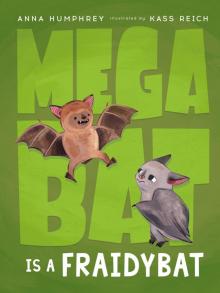 Megabat Is a Fraidybat
Megabat Is a Fraidybat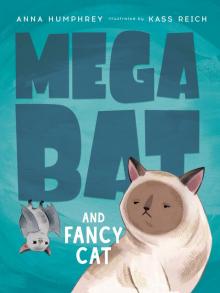 Megabat and Fancy Cat
Megabat and Fancy Cat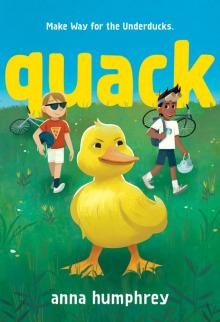 Quack
Quack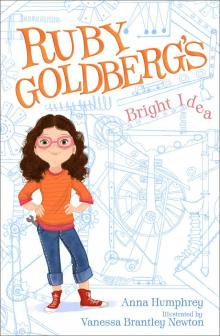 Ruby Goldberg’s Bright Idea
Ruby Goldberg’s Bright Idea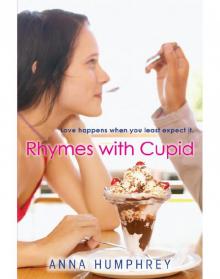 Rhymes with Cupid
Rhymes with Cupid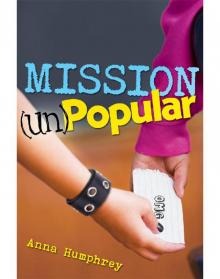 Mission (Un)Popular
Mission (Un)Popular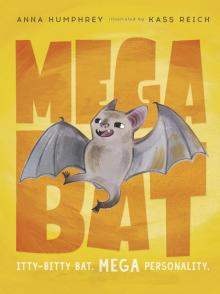 Megabat
Megabat